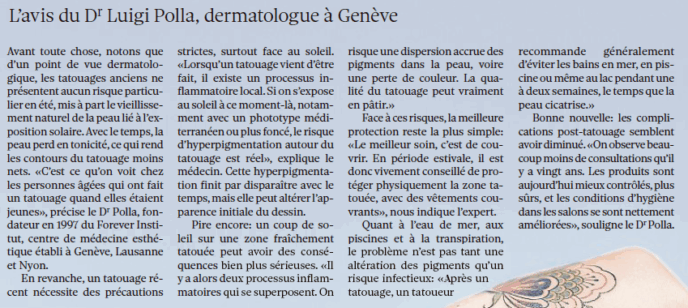Article: Tattooing in summer: a bad idea?
Interview with Dr Luigi L. Polla, dermatologist and founder of Forever Institut, published in 24Heures on 08.08.2025


With less stress and more time on your hands, what if summer was the ideal time to get a tattoo? Answers from the experts.
In a nutshell:
- New tattoos require strict protection against summer sun exposure.
- Seawater and swimming pools present risks of post-tattoo infection.
- Complications are decreasing thanks to better hygiene conditions in salons.
Summer, holidays, free time and lighter looks seem conducive to impulsive decisions... like getting a tattoo. But with sun exposure, swimming and perspiration, is this season really compatible with the care and maintenance of your skin? healing a tattoo? Find out from Lena, a seasoned dermographer at Rockin Rolls in Lausanne.
Do you notice an increase in requests for tattoos during the summer?
Lena: No, that's just it. Many people hesitate to get a tattoo in summer. They want to sunbathe, swim in the lake, the sea or the pool. As a result, there's generally a drop in the number of tattoo clients during this period. So summer is often a quieter time for tattoo artists, a season we dread a little. We try to anticipate by offering small designs that heal quickly, or by making arrangements with customers who are prepared to put their summer on hold for two to four weeks. Honestly, sacrificing a few days for a tattoo that lasts a lifetime isn't that big a compromise. But I understand that not everyone is ready for that. That said, summer shouldn't be an absolute brake. There are even certain advantages to getting a tattoo at this time of year. It's especially in tourist areas that there's a peak in demand, sometimes on a whim, when you're going out for the evening or on holiday. In Switzerland, for example, the opposite is true.
Have you ever heard of customers having problems after a summer tattoo?
Personally, no. I haven't had any negative feedback from my clients about tattoos done in summer. But I have seen cases, particularly of people tattooed abroad, who went swimming immediately afterwards or got sunburned. And yes, the results can be very disappointing, or even problematic, in the event of infection.
Are there any advantages to getting a tattoo in summer?
Absolutely. In summer, we're often more relaxed, sometimes taking time off, and less stressed. Your body recuperates better, and you have more time to take care of your tattoo. We also wear less clothing, which allows the tattoo to breathe better and heal more easily. In winter, tight or woollen clothes can irritate the skin. In summer, loose-fitting clothing or nothing at all over the tattooed area is ideal. As for the sun, if used in moderation, it can help the healing process by drying out the skin a little. But be careful: we're talking about short exposures, not long exposures. bronzette of several hours. To sum up: if well managed, summer can be a good time to get a tattoo.
And what are the specific risks of getting a tattoo at this time of year?
The main risks are exposure to the sun and swimming. A recent tattoo is fragile: sunburn or irritation can seriously affect the result, or even lead to infection. Sweating is another factor to watch out for. If not cleaned regularly, acidity can irritate the skin and disrupt healing. So you need to be particularly vigilant.
In practical terms, what precautions should you take?
For the first two weeks, it is essential to avoid direct exposure to the sun. Cover the area with a light cloth, bandana or bandage, depending on what you do during the day. Personally, I don't always cover my tattoos, but I stay in the shade and never expose them to direct sunlight. Once the scar has healed, you should systematically apply sun cream SPF 50, no matter how old your tattoo is. It's essential to protect it and prevent it fading over time.
What areas of the body would you recommend or advise against tattooing during the summer?
There are no areas to avoid absolutely, but some are easier to manage. For example, areas that are less exposed: chest, hips, buttocks... These can be kept covered more easily. But even an arm or a leg can be covered. Just cover them with a cloth or a light garment when you go out or expose yourself. The important thing is to plan ahead, depending on your activities and the clothes you'll be wearing.
Are there differences in post-tattoo care depending on the season?
Care remain the same all year round. What changes is the vigilance: in summer, you need to insist more on sun protection, avoid sunburn and remember to cleanse a little more because of the sweat. But the basic steps (cleansing, moisturising, protection) are the same, whatever the season.
What time of year do you prefer to tattoo?
I really like spring. It's the right time: tattoos have time to heal before summer, so you can show them off and enjoy the beach without worry. Personally, I'm not a big fan of tanningSo that's not what bothers me, but I'm careful about swimming. If I know I'm going on holiday, I plan my tattoos before or after. But really, any time of year is a good time to get a tattoo, as long as you adapt your skin care.
The opinion of Dr Luigi Polla, dermatologist in Geneva
First of all, from a dermatological point of view, old tattoos pose no particular risk in summer, apart from the natural ageing of the skin linked to exposure to the sun. Over time, the skin loses tone, making the outline of the tattoo less clear. "This is what we see in older people who had tattoos when they were young", explains Dr Polla, founder in 1997 of the Forever Institut, a skin care centre that offers a wide range of tattoo treatments. aesthetic medicine based in Geneva, Lausanne and Nyon.
On the other hand, a recent tattoo requires strict precautions, especially in the sun. "When a tattoo has just been applied, there is a local inflammatory process. If you are exposed to the sun at that time, particularly with a Mediterranean or darker phototype, there is a real risk of hyperpigmentation around the tattoo", explains the doctor. This hyperpigmentation will eventually disappear over time, but it can alter the initial appearance of the design.
Worse still, a sunburn on a freshly tattooed area can have far more serious consequences. "In this case, there are two superimposed inflammatory processes. There's a risk of increased dispersion of pigments in the skin, and even a loss of colour. The quality of the tattoo can really suffer".
"The best care is to cover up".
Faced with these risks, the best protection is still the simplest: "The best care is to cover up. During the summer months, we strongly advise you to physically protect the tattooed area with covering clothing", says the expert.
As for seawater, swimming pools and perspiration, the problem is not so much a deterioration in the pigments as an infectious risk: "After a tattoo, a tattooist generally recommends avoiding bathing in the sea, swimming pool or even lake for one to two weeks, while the skin heals".
The good news is that post-tattoo complications appear to have fallen. "There are far fewer consultations than twenty years ago. Today's products are better controlled and safer, and hygiene conditions in salons have improved considerably", says Dr Polla.
